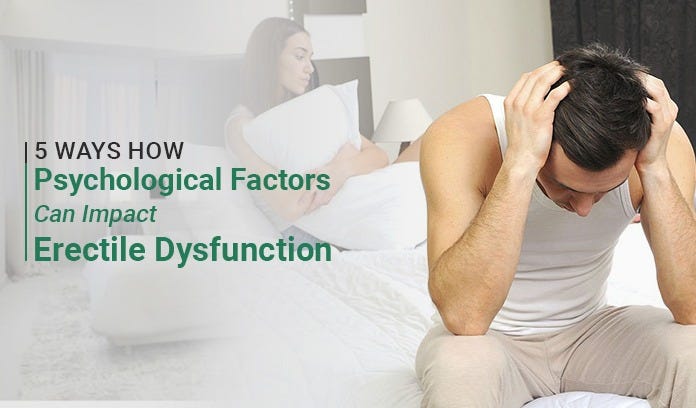
Understanding The Psychological Factors Behind Erectile Dysfunction
Erectile dysfunction (ED), often colloquially referred to as impotence, is a common and distressing condition that affects millions of men worldwide. While it is often attributed to physical causes such as vascular problems or hormonal imbalances, it’s crucial to recognize that psychological factors play a significant role in the development and persistence of ED. In this comprehensive article, we will delve deep into understanding the psychological factors behind erectile dysfunction, their impact, and potential treatment options.
- The Mind-Body Connection
An erection is a complex physiological process that involves the brain, nerves, hormones, and blood vessels. When the brain receives sexual stimulation, it sends signals to the nerves in the pelvic area, leading to increased blood flow to the penis and an eventual erection.
However, this process is highly influenced by emotional and psychological factors. Stress, anxiety, depression, and relationship issues can disrupt the delicate balance required for a successful erection. Let’s explore these factors in detail.
- Stress And Anxiety
Stress and anxiety are two of the most common psychological factors contributing to ED. The fast-paced, demanding nature of modern life can lead to chronic stress, which, in turn, triggers a physiological response known as the “fight or flight” response. This response is designed to prepare the body for immediate action, diverting resources away from non-essential functions like sexual arousal.
Chronic stress and anxiety can lead to a heightened state of arousal, making it challenging for men to achieve or maintain an erection. Additionally, performance anxiety, often associated with fear of not meeting expectations or concerns about sexual performance, can become a self-fulfilling prophecy, exacerbating the problem.
- Depression
Depression is another prevalent psychological factor that can contribute to erectile dysfunction. Depression often leads to a range of physical and emotional symptoms, including fatigue, reduced libido, and decreased self-esteem. These symptoms can directly impact a man’s ability to achieve and sustain an erection.
Furthermore, the medications used to treat depression, such as selective serotonin reuptake inhibitors (SSRIs), are known to have sexual side effects, including ED. Balancing the benefits of treating depression with the potential sexual side effects can be a challenging decision for both patients and healthcare providers.
- Relationship Issues
Erectile dysfunction can strain even the most robust of relationships. Relationship problems, such as unresolved conflicts, lack of emotional intimacy, or communication issues, can contribute to ED. When there is tension, anger, or emotional distance between partners, it can be challenging to feel sexually connected and confident, leading to difficulties in achieving or maintaining an erection.
Moreover, the fear of disappointing one’s partner or the pressure to perform can exacerbate the issue. This, in turn, can create a vicious cycle where ED contributes to relationship problems, which, in turn, worsen the ED.
- Past Trauma And Sexual History
Past traumatic experiences or negative sexual encounters can have a lasting impact on an individual’s sexual function. Sexual abuse, assault, or even a history of sexual shame and guilt can lead to psychological scars that manifest as sexual dysfunction later in life. It’s essential to acknowledge the importance of addressing past trauma in the context of ED treatment, as these experiences can profoundly affect a person’s sexual self-esteem and confidence.
- Body Image And Self-Esteem
A person’s perception of their body and self-esteem can significantly influence their sexual confidence. Men who struggle with body image issues, whether related to weight, appearance, or physical abilities, may experience anxiety and stress that hinder their sexual performance. Feeling unattractive or unworthy can be a powerful psychological barrier to sexual satisfaction.
- Coping Mechanisms And Unhealthy Habits
In response to the emotional distress caused by ED or other psychological factors, some men may develop unhealthy coping mechanisms. These can include overuse of alcohol, tobacco, or other substances, which can exacerbate the problem by further affecting sexual function.
Understanding the relationship between these psychological factors and erectile dysfunction is crucial, as it allows individuals and healthcare providers to develop effective treatment strategies. Here are some approaches to addressing ED with a focus on psychological factors:
Psychotherapy: Cognitive-behavioral therapy (CBT) and sex therapy can help individuals identify and address underlying psychological issues contributing to ED. These therapeutic approaches provide tools and strategies to manage stress, anxiety, and relationship problems.
Medication Management: For individuals whose ED is linked to depression or anxiety, adjusting or changing medications under the guidance of a healthcare provider may help alleviate sexual side effects.
Stress Reduction Techniques: Learning stress management techniques, such as mindfulness, meditation, and relaxation exercises, can help reduce anxiety and improve sexual function.
Relationship Counseling: Couples therapy can be beneficial in addressing relationship issues contributing to ED. Improved communication and emotional intimacy can positively impact sexual health.
Sexual Education and Awareness: Education about sexual function and healthy sexual practices can help dispel myths and reduce performance anxiety.
Self-Esteem and Body Image Work: Addressing body image issues and working on self-esteem can improve sexual confidence.
Support Groups: Joining support groups for individuals with ED can provide a sense of community and shared experiences, reducing feelings of isolation.
Conclusion
Erectile dysfunction is a complex condition influenced by a variety of factors, including psychological ones. Understanding the role of stress, anxiety, depression, relationship issues, past trauma, body image, and self-esteem in ED is crucial for effective treatment and support. It’s important to remember that seeking professional help is a positive and proactive step toward addressing these psychological factors and restoring sexual health and overall well-being. With the right guidance and support, many men can overcome the psychological barriers that contribute to ED and lead fulfilling, satisfying lives.



